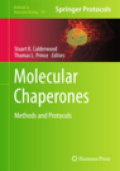
Molecular chaperones: methods and protocols
Calderwood, Stuart K.
Prince, Thomas L.
The proteome consists of a complex mixture of proteins each of which need to be folded correctly in order to function for the health of the organism, and many of these proteins require molecular chaperones to reach the correct conformation and, in some cases, to remain in a folded form. In Molecular Chaperones: Methods and Protocols , expert researchers address a wide variety of approaches to the study these mechanisms, featuring the workings of heat shock proteins and heat shock transcription factors, in vitro and in vivo. Written in thehighly successful Methods in Molecular Biology™ series format, chapters features introductions to their respective topics, lists of the necessary materialsand reagents, step-by-step, readily reproducible laboratory protocols, and tips on troubleshooting and avoiding known pitfalls. Authoritative and cutting-edge, Molecular Chaperones: Methods and Protocols serves as an ideal guide for all scientists who wish to pursue this vital biological action and its impact on human health and disease. Approaches the study of heat shock transcription factors both in vivo and in vitro. Features step-by-step protocols which are tested and ready for the lab. Includes expert tips and vital implementation advice to ensure successful results. INDICE: Targeted Deletion of Hsf1, 2, and 4 Genes in Mice. The Role Of Heat Shock Factors in Stress-Induced Transcription. Hsp90 and Client Protein Maturation.- The Role of p23, Hop, Immunophilins, and Other Co-Chaperones in Regulating Hsp90 Function. Detecting Hsp90 Phosphorylation. Role of Molecular Chaperones in Biogenesis of the Protein Kinome. Nucleotide Exchange Factors for Hsp70 Chaperones. Reconstitution of CHIP E3 Ubiquitin Ligase Activity. Structure-Functions of HspB1 (Hsp27). Combined Lentiviral and RNAi Technologies for the Delivery and Permanently Silencing of the hsp25 Gene. Quantification of HSP27 and HSP70 Molecular Chaperone Activities. Measuring Hsp72 (HSPA1A) by IndirectSandwich ELISA. Analysis of Heat Shock Protein Localization Using Flow Cytometry. Quantitation of Heat Shock Proteins in Clinical Samples Using Mass Spectrometry. Bioinformatic Approach to Identify Chaperone Pathway Relationship fromLarge-Scale Interaction Networks. Hsp70: Anti-Apoptotic and Tumorigenic Protein. Determination of Cell Survival or Death. Immunohistochemistry of Human Hsp60 in Health and Disease: From Autoimmunity to Cancer. Preparation of a Heat Shock Proteins 70-Based Vaccine from DC-Tumor Fusion Cells. Isolation of Heat Shock Protein Complexes. Enhancing Antigen Cross-Presentation and T-Cell Priming by Complexing Protein Antigen to Recombinant Large Heat Shock Protein. Investigating Receptors for Extracellular Heat Shock Proteins. Analysis of CellularMigration Using a Two-Chamber Methodology.
- ISBN: 978-1-61779-294-6
- Editorial: Humana Press
- Encuadernacion: Cartoné
- Páginas: 320
- Fecha Publicación: 28/10/2011
- Nº Volúmenes: 1
- Idioma: Inglés
